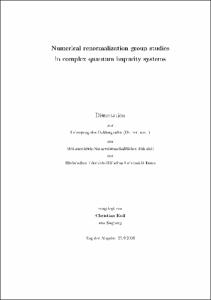Kolf, Christian: Numerical renormalization group studies in complex quantum impurity systems. - Bonn, 2006. - Dissertation, Rheinische Friedrich-Wilhelms-Universität Bonn.
Online-Ausgabe in bonndoc: https://nbn-resolving.org/urn:nbn:de:hbz:5N-09286
Online-Ausgabe in bonndoc: https://nbn-resolving.org/urn:nbn:de:hbz:5N-09286
@phdthesis{handle:20.500.11811/2696,
urn: https://nbn-resolving.org/urn:nbn:de:hbz:5N-09286,
author = {{Christian Kolf}},
title = {Numerical renormalization group studies in complex quantum impurity systems},
school = {Rheinische Friedrich-Wilhelms-Universität Bonn},
year = 2006,
note = {In this thesis we summarize several theoretical studies in the context of quantum impurity systems. We implement the numerical renormalization group (NRG) technique as a powerful method for the solution of the Kondo and the Anderson impurity model. The extension of the standard NRG, which deals with static properties and the calculation of thermodynamics, towards the calculation of dynamical properties is accurately described in our work.
We study the distribution of the Kondo temperature TK versus the Kondo coupling strength J in the two-channel Kondo (2CK) model by means of an extended NRG program. We show that a wide distribution of the couplings J leads to a peaked distribution of TK. This gives an explanation of the zero-bias anomalies measured in quantum point contact experiments.
Conductance measurements in scanning tunneling microscopy (STM) experiments of transition metal impurities on metal surfaces are analyzed in this thesis. By combining correlated electron techniques with density functional calculations we show that the transport occurs through the atomic multi-electron states, and we identify their signature in the STM lineshape. A careful analysis of the different relative strengths of the transmission channels allows to determine the spatial orientation of the atomic orbitals of Kondo atoms on a metal surface. Our interpretation is that the tunneling predominantly occurs into the local orbital, which sticks out most out of the metal surface.},
url = {https://hdl.handle.net/20.500.11811/2696}
}
urn: https://nbn-resolving.org/urn:nbn:de:hbz:5N-09286,
author = {{Christian Kolf}},
title = {Numerical renormalization group studies in complex quantum impurity systems},
school = {Rheinische Friedrich-Wilhelms-Universität Bonn},
year = 2006,
note = {In this thesis we summarize several theoretical studies in the context of quantum impurity systems. We implement the numerical renormalization group (NRG) technique as a powerful method for the solution of the Kondo and the Anderson impurity model. The extension of the standard NRG, which deals with static properties and the calculation of thermodynamics, towards the calculation of dynamical properties is accurately described in our work.
We study the distribution of the Kondo temperature TK versus the Kondo coupling strength J in the two-channel Kondo (2CK) model by means of an extended NRG program. We show that a wide distribution of the couplings J leads to a peaked distribution of TK. This gives an explanation of the zero-bias anomalies measured in quantum point contact experiments.
Conductance measurements in scanning tunneling microscopy (STM) experiments of transition metal impurities on metal surfaces are analyzed in this thesis. By combining correlated electron techniques with density functional calculations we show that the transport occurs through the atomic multi-electron states, and we identify their signature in the STM lineshape. A careful analysis of the different relative strengths of the transmission channels allows to determine the spatial orientation of the atomic orbitals of Kondo atoms on a metal surface. Our interpretation is that the tunneling predominantly occurs into the local orbital, which sticks out most out of the metal surface.},
url = {https://hdl.handle.net/20.500.11811/2696}
}






